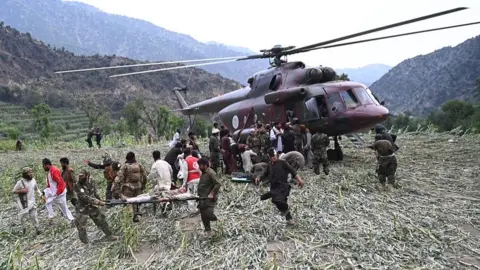A fresh magnitude-5.2 aftershock has struck eastern Afghanistan - two days after a powerful quake in the same region killed more than 1,400 people and injured 3,000 others, according to the Taliban government.
Rescue efforts following Sunday's magnitude-six quake have been complicated by landslides that have blocked roads, making land travel difficult.
Helicopters have been deployed to aid the search for survivors in the ruins of remote villages, where many are feared trapped under the rubble.
The Taliban government - which is only recognised by Russia - has appealed for international help. The UN has released emergency funds, while the UK has pledged £1m ($1.3m) in aid.
Afghanistan is prone to earthquakes, but Sunday's tremor was one of the strongest to hit in recent years.
The aftershock on Tuesday came at 12:29 (07:59 GMT) with its epicentre 34km (21 miles) away from Jalalabad, the country's fifth-largest city, according to the US Geological Survey (USGS). It was shallow, at only 10km deep.
A BBC reporter in the Sawkai district - one of the worst affected areas in the north-eastern Kunar province - said they felt a strong jolt.
Aid agency Save the Children has sent medical teams to the Kunar province to treat and rescue people in remote areas, where it said thousands were in urgent need of food, water and shelter.
At Jalalabad's Nangrahar Regional Hospital, earthquake survivor Nader Khan broke down as he recalled how he lost two sons and two daughters-in-law to the earthquake.
The most recent earthquake hit Afghanistan when it is reeling under severe drought and an unprecedented hunger crisis, compounded by massive aid cuts from the US this year.
International support is being coordinated, with efforts from various countries emphasizing the need for a swift humanitarian response.

















